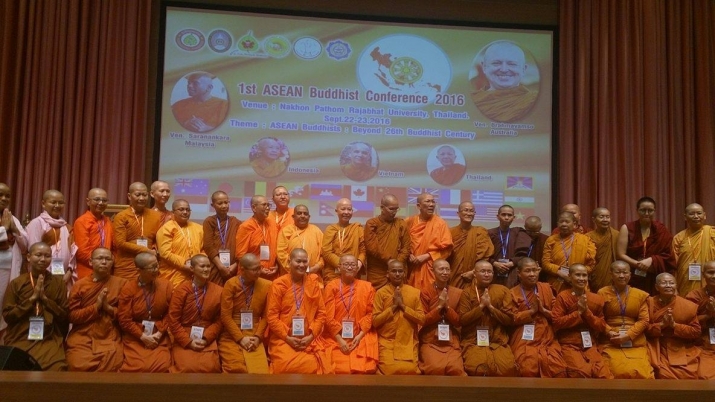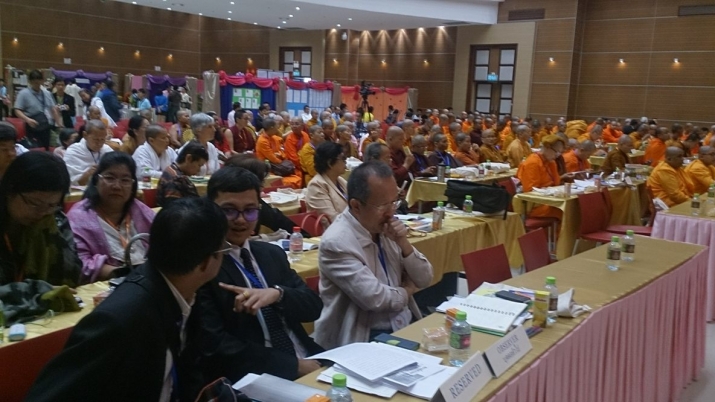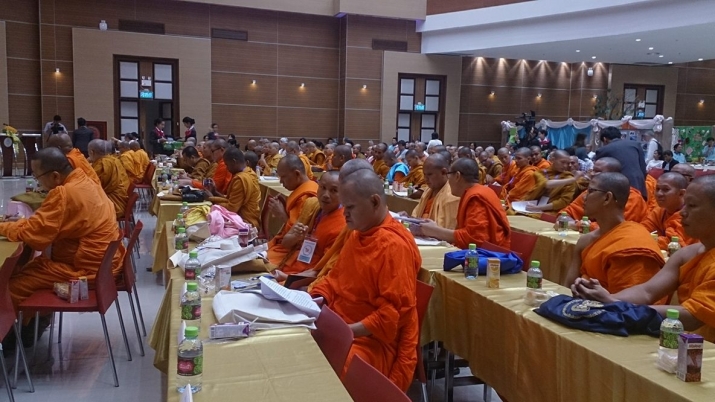FEATURES|THEMES|Social Engagement
Beyond 2,600 Years of Buddhism: A Reflection on the 1st ASEAN Buddhist Conference on ASEAN Buddhists
 Group photo of bhikkhunis at ABC-1 on 22 September. Image courtesy of the author
Group photo of bhikkhunis at ABC-1 on 22 September. Image courtesy of the authorThe 1st ASEAN Buddhist Conference (ABC-1) on ASEAN Buddhists: Beyond the 26th Buddhist Century was held on 22–23 September at Nakhonpathom Rajabhat University in Thailand. I participated in this conference to present a paper entitled, “Who Will Care for Buddhists?: Addressing Communal Violence Against Minority Buddhists in Muslim-Majority Bangladesh.”
Some six months ago, I received an email from Dr. Amarjiva Lochan, the organising secretary for the conference, who enthusiastically informed me of ABC-1. As a Bangladeshi, I was eager to draw attention to frequent the communal violence between Muslim and Buddhist communities in the neighboring countries of Bangladesh and Myanmar, which has negatively affected the balance of peace and security in the region. I proposed solutions that could help minority Buddhists in Bangladesh resolve conflicts and promote religious tolerance and harmony.
ABC-1 was aimed at addressing a range of challenges for ASEAN Buddhists, including those faced by female monastics, who are often neglected or discriminated against by a large number of Theravada monks. The organizing committee also celebrated the 72nd birth anniversary of Ven. Dr. Dhammananda Bhikkhuni (Chatsumarn Kabilsingh Shatsena), the first Theravada bhikkhuni in Thailand, who has contributed immensely to the revival of the bhikkhuni order.
The conference also focused on how participants could build a network of ASEAN Buddhist academics, how to create support for Buddhists to work together, how to propagate Buddhism in the 26th Buddhist century, and how to formulate joint agreements on future development plans for ASEAN Buddhists. In all, 44 papers were presented by delegates from 22 countries.
The first day of the conference began with a performance of traditional Thai dance. After the opening ceremony, Ajahn Brahmavamso delivered the keynote speech titled “We are on the Right Side of History,” which addressed the history of the bhikkhuni order and encouraged listeners to help revive the order. Ven. Dhammananda, another important Thai bhikkhuni, read a message from His Holiness the Dalai Lama especially for this occasion.
The first session of the conference was titled “The Most Senior ASEAN Bhikkhunis,” during which Dr. Bhikkhuni Viditadhamma Theri (Vietnam), Bhikkhuni Santini Theri (Indonesia), and Ven. Dhammananda Theri (Thailand) presented papers titled “The Theravada Bhikkhuni Sangha: Twenty Years after the Re-establishment (1996–2016),” “The Bhikkhuni Sangha in Indonesia,” and “The Recent Establishment of Theravada Bhikkhunis,” respectively.
 Audiences at the first session of ABC-1. Image courtesy of the author
Audiences at the first session of ABC-1. Image courtesy of the authorThe second session was divided into two panels about Buddhism and women (the second panel was specifically about Thai Buddhist women). Unusually, a large number of monks and nuns from different countries presented papers on nuns’ issues. Ven. Dhammananda said of this happy outcome: “We particularly wanted the local Thai monks to have a venue where they can see the interaction of bhikkhus from other countries reacting to the bhikkhunis in a positive way—allowing them to see, to understand the issue from different perspective. And at ABC-1 I would say that we have been successful.”
Ven. Dhammananda provided two reasons: “Firstly, our keynote speaker was Ven. Ajahn Brahm, a well-known Theravada monk ordained in the Thai sangha. Secondly, the provincial chief [monk] accepted our invitation to attend, he was so kind. He told me that although he had a fever and had developed a rash he wanted to keep his promise to come and offer a gift to Ajahn Brahm. Also, the local bhikkhunis were very supportive; more than 40 attended.”
I, personally, felt very much encouraged by this turn of events as I strongly support the revival of the bhikkhuni order in Bangladesh. I feel the question of nuns is a shared problem. Many feel that the community of male monastics, which holds the reins of executive power over Buddhists in Thailand, have consistently excluded women from full ordination. In November last year, Thailand’s Supreme Sangha Council urged the Thai government to block several Sri Lankan monks from entering Thailand after they had ordained eight women as bhikkhunis.
 Monastic attendees at the first session of ABC-1. Image courtesy of the author
Monastic attendees at the first session of ABC-1. Image courtesy of the authorIn my own presentation, I argued that communal violence is most common in countries where extremist religious leaders incite mob violence. On the Buddhist side, I cited the Bodu Bala Sena, a Sri Lankan Buddhist nationalist organization, and 969, an anti-Rohingya Muslim movement in Myanmar. On the other hand, minorities in Muslim countries such as Afghanistan, Bangladesh, and Pakistan experience religious violence perpetuated in the name of Islam. Islamic fundamentalists often play the role of organizers and instigators in cases of sectarian and communal violence.
I also discussed a proposal by the government of India, which is considering changing the Citizenship Act of 1955 to offer shelter to oppressed Afghani, Bangladeshi, and Pakistani minorities. India would like to assist Buddhists, Christians, Hindus, Jains, Sikhs, and others by issuing long-term visas and providing facilities such as bank accounts, businesses, and land-purchase rights in India. I argued that in the long term, rather than India feeling compelled to help, non-Muslim minorities in Muslim countries could be better assisted if those countries' governments took more seriously the idea of religious equality and non-discrimination.
The conference ended with concluding speeches by Bhikkhu Saranankara from Malaysia and Dr. Amarjiva Lochan, but the stories and issues discussed at the conference will continue. Ven. Dhammananda told me that the 2nd ASEAN Buddhist Conference (ABC-2) might be held at Vesali, India, in 2018.
See more
1st ASEAN Buddhist Conference (International Network of Engaged Buddhists)
The Shifts in ABC (Thai Bhikkhunis.org)
Related
Thailand Hosts 1st ASEAN Buddhist Conference (Buddhistdoor Global)














